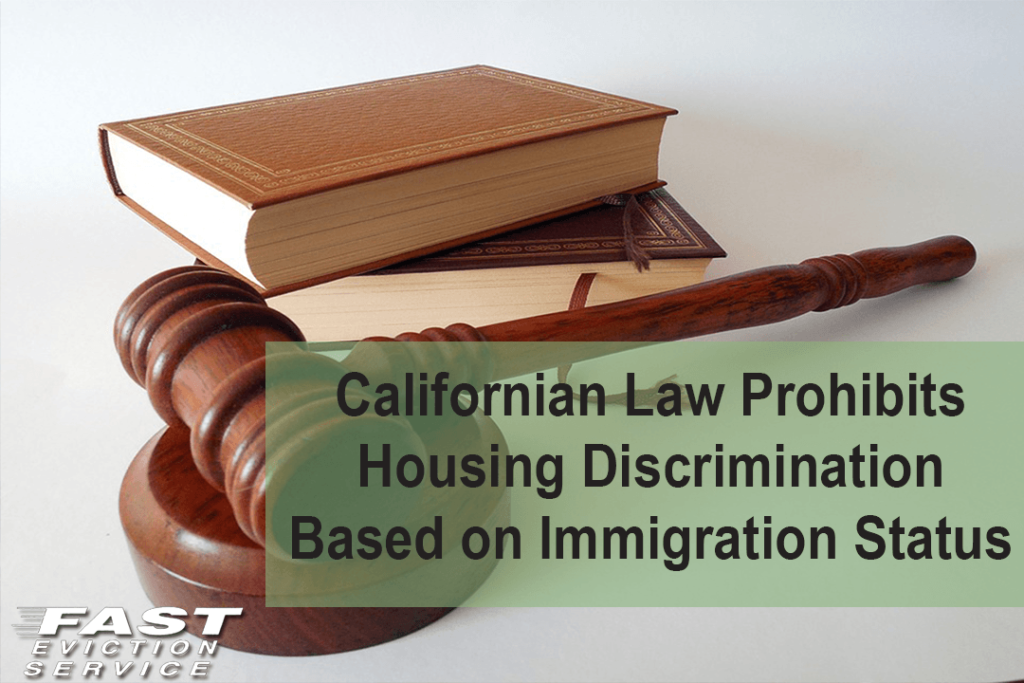Californian Law Prohibits Housing Discrimination Based on Immigration Status

Calif. Business and Professions Code §6103.7; Calif. Civil Code §§1940.05, 1940.2, 1940.3, 1942.5, 1940.35, 3339.10; Calif. Code of Civil Procedure §1161.4
Amended by A.B. 291
Effective from 1st January 2018, it will become unlawful for a landlord to take action against their tenants solely on grounds of immigration status. As per the California Legislature, it is the civil right of an individual to seek, rent and hold housing and a landlord cannot refuse from renting out the unit or engage in any form of discrimination, especially discrimination based upon immigration status, religion, ethnicity or gender oriented.
Furthermore, landlord cannot force tenant to involuntarily vacate the rental unit; in this regard it is worth noting that landlord cannot threaten the tenant to disclose his/her immigration or citizenship status. California law also prohibits the landlord from asking for information about immigration and citizenship status from someone associated with the tenant. If any of these situations occur, the tenant has the right to take the matter to the court of law and file a complaint The tenant can use the violation of this restriction from the landlord as a point of defense.
It must be noted that the law also prohibits the landlord and their agent(s) from indulging in the following activities:
- Threatening the tenant for disclosing information about the citizenship and/or immigration status and to force him or her to vacate the property
- Threatening another person associated with the tenant (such as a family member) to disclose information about his or her citizenship/immigration status
- Landlord cannot compel another person associated with the tenant to compel the tenant from vacating the property
- Law prohibits landlords from disclosing the immigration and/or citizenship status of a prospective or existing tenant to a third-party with the intent of harassing or influencing the tenant for vacating the property
- Landlord cannot disclose the immigration/citizenship status related information of a tenant, person associated with the tenant or occupant to any law enforcement agency, government institution and/or immigration authority with the intent of harassing the tenant or compelling him/her to vacate the property
However, it is always possible that landlord mistakenly or deliberately disclose the citizenship and/or immigration status information of a tenant or occupant to a third-party. In such a scenario, the court is entitled to:
- Place an order that the landlord must pay civil penalties to the tenant. The amount in such a case would be between 6 and 12 times the monthly rent landlord has been charging the tenant for occupying the unit
- Issue an injunctive relief so that the landlord is prevented from violating the law in future
- Notify the District Attorney regarding the tendency of a landlord regarding violation or extortion laws
- Inform the amount of attorney fee and costs to the prevalent party
Remember that a California landlord cannot be held accountable for violating these restrictions when they are complying with:
- Any federal government program offering rent limitations and/or rental assistance to eligible tenants such as HUD Section 8
- Subpoena
- Warrant
- An order issued by a court of law
Ignorance of the law is no defense! It is essential as a California landlord to know your obligations and duties under this new law and avoid any questions or disclosure of immigration status regarding prospective tenant screening or existing tenants you already have residing in your rental property to avoid discrimination based on immigration status.
At Fast Eviction Service, help on any of the issues discussed in this article is simply a click or phone call away. Email intake@fastevict.com or call our office at (800) 686-8686 to discuss your questions for a free evaluation of your case.
Hud's New Guidelines For Criminal Records In The Rental Tenant Screening Process
The Department of Housing and Urban Development (HUD) has released a 10 page guide on new rental tenant screening laws. This new guide could possibly mean disaster to many landlords and managers of rental properties as it basically changes the rules we all know regarding the rejection of an tenant applicant due to their criminal history. Read More...
What To Do When A Landlord Gets Sued By A Tenant
The first thing a property owner should do if a tenant sues is to review the tenant’s file to ensure that the information in the file is up to date. Gather all the information you have on the tenant in one place for easy access. The landlord will also need to find and review all insurance policies that it has on the property. Read More...
Five Challenges For Landlords When Renting To Tenants Under Section 8
Section 8 of the American Housing Act 1937 lays out the rules for the Housing Choice Voucher Program and sets out Housing Quality Standards for landlords to follow. Section 8 Voucher Program is a tenant-oriented rental assistance package which allows a tenant to move from a house that offers minimum level housing quality to another. Read More...
Filed under: Tenant Screening
